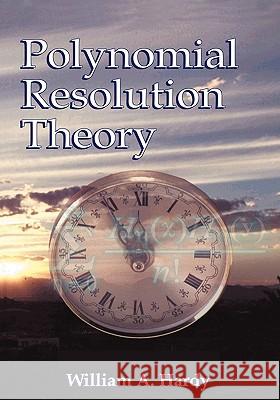Polynomial Resolution Theory » książka
Polynomial Resolution Theory
ISBN-13: 9781412044530 / Angielski / Miękka / 2005 / 228 str.
This book is the definitive work on polynomial solution theory. Starting with the simplest linear equations with complex coefficients, this book proceeds in a step by step logical manner to outline the method for solving equations of arbitrarily high degree.
Polynomial Resolution Theory is an invaluable book because of its unique perspective on the age old problem of solving polynomial equations of arbitrarily high degree.
First of all Hardy insists upon pursuing the subject by using general complex coefficients rather than restricting himself to real coefficients. Complex numbers are used in ordered pair (x, y) form rather than the more traditional x ] iy (or x + jy) notation.
As Hardy comments, "The Fundamental Theorem of Algebra makes the treatments of polynomials with complex coefficients mandatory. We must not allow applications to direct the way mathematics is presented, but must permit the mathematical results themselves determine how to present the subject. Although practical, real-world applications are important, they must not be allowed to dictate the way in which a subject is treated. Thus, although there are at present no practical applications which employ polynomials with complex coefficients, we must present this subject with complex rather than restrictive real coefficients."
This book then proceeds to recast familiar results in a more consistent notation for later progress. Two methods of solution to the general cubic equation with complex coefficients are presented. Then Ferrari's solution to the general complex bicubic (fourth degree) polynomial equation is presented. After this Hardy seamlessly presents the first extension of Ferrari's work toresolving the general bicubic (sixth degree) equation with complex coefficients into two component cubic equations. Eight special cases of this equation which are solvable in closed form are developed with detailed examples. Next the resolution of the octal (eighth degree) polynomial equation is developed along with twelve special cases which are solvable in closed form.
This book is appropriate for students at the advanced college algebra level who have an understanding of the basic arithmetic of the complex numbers and know how to use a calculator which handles complex numbers directly.
Hardy continues to develop the theory of polynomial resolution to equations of degree forty-eight. An extensive set of appendices is useful for verifying derived results and for rigging various special case equations.











